- Home
- Harlan Coben
Don't Let Go Page 20
Don't Let Go Read online
Page 20
World-renowned pianist Andy Reeves is a gifted vocalist, a comedian, and the all-around entertainer nicknamed by those who love him "the Other PianoMan" . . .
Oh boy.
I skim down. Andy "occasionally" does "high-end" private parties such as "weddings, corporate events, birthdays, and bar/bat mitzvahs." A burst in the middle of the page reads: Want to join the Other PianoMan fan club? Stay in touch via our newsletter!
Below that there is a place to type in my email. I demur.
Down the left side of the page, the buttons read "Home," "Bio," "Photos," "Song Lists," "Schedule" . . .
I click "Schedule." I scan down until I find today. His gig at the Rusty Nail is listed until 6:00 P.M. Beneath that, it shows he'll be playing at a club called Hunk-A-Hunk-A from 10:00 P.M. until midnight.
My phone buzzes. It's a text from Ellie.
You awake?
My thumbs start going: It's only ten. Yes.
Want to go for a quick walk?
Sure. Want me to swing by?
The little dots are moving. Then Ellie's message appears: I'm already walking. Meet me at the BF lot.
I pull into the empty middle school lot five minutes later. Ellie and Bob don't live far from here. Like most school lots, this one is lit up pretty well, but I don't see her. I park and get out of the car.
"Over here."
There is a classic school playground out on the left. Swings, slides, climbing walls, nets, ladders, monkey bars, all floored by soft mulch. Ellie sits on a swing. She is pushing herself with her feet, but only a little, so the effect is more like a comforting rocking than anything in the swing family.
The cedar smell from the mulch gets stronger as I walk toward her. "You okay?" I ask.
Ellie nods. "I just didn't want to go home yet."
I'm not sure what to say to this, so I settle for a nod.
"I loved playgrounds when I was a kid," Ellie says. "Do you remember the game four square?"
"No," I say.
"Never mind. I'm being silly. I come here a lot, though."
"To this playground?"
She nods. "At night. I'm not sure why."
I take the swing next to her. "I didn't know."
"Yeah, we are learning a lot about each other," Ellie says.
I think about that. "Not really."
"What do you mean?"
"You know everything about me, Ellie. Just because I never told you about beating Trey, well, you knew it was me."
She nods. "I did."
"And the other times. With Roscoe and Brandon and I forget Alicia's boyfriend's name."
"Colin."
"Right."
"So you know everything about me. Everything."
"The implication being that you don't know everything about me?"
I don't reply.
"Fair enough," Ellie says. "I don't tell you everything."
"You don't trust me?"
"You know better."
"So?"
"So I'm allowed my secrets. I shouldn't have told you about Bob because now you'll hate him and think about hurting him."
"A little," I confess.
She smiles. "Don't. You don't get it. He's the same man you admired this morning."
I don't agree, but I don't see any point in voicing that.
Ellie stares up at the night sky. There are a handful of stars out, but it feels like there should be more. "I heard from Maura's mom. The guy in the picture you sent? It's the same man who interrogated her. The pale guy with the whispery voice."
I'm not surprised. "I saw him earlier today."
"Who is he?"
"His name is Andy Reeves." I gesture with my chin toward the Path. "He ran the military base when Leo and Diana were killed."
"You talked to him?"
I nod.
"Did he say anything?"
"He threatened to kill everyone I love."
I just look at her.
"Another person who suggests you let it go," Ellie says.
"Suggests?"
She shrugs.
"But, yes. Joining you and Augie."
"Augie. There's someone else you love."
I nod.
"Are you considering it?"
"What? Dropping the case?"
"Yes."
"I am."
Ellie looks back toward the Path. Her eyes narrow.
"What?" I ask.
"I may reconsider."
"Meaning?"
"I don't think you can drop this now."
"I can if it puts you or the girls at risk."
"No, it's just the opposite."
"I'm not following," I say.
"I know I was the one who said you should let it go. But that was before this creepy guy threatened my kids. Now I don't want to let it go. If we do, he'll always be out there. I'll always be looking over my shoulder."
"If I let it go, he won't bother you."
"Right," Ellie says with a scoff. "Tell that to Rex and Hank."
I could argue that Rex and Hank posed a more direct threat, that they were actual eyewitnesses to that helicopter hovering over the base fifteen years ago, but I don't think it would matter. I get what she's saying. Ellie doesn't want to live in fear. She wants me to take care of it, and she doesn't want to know how.
Ellie pushes with her legs harder now. The swing goes back, and using the momentum, she gracefully jumps off as it comes forward, even triumphantly raising her hands like a gymnast sticking the landing. I care so much about her, and yet for the first time I'm realizing I still don't know her, and that's making me care all the more.
"I won't let anything happen to you," I say.
"I know."
I remember the schedule I'd seen a little earlier on the "Andy the Other PianoMan" website. He'll be at the Hunk-A-Hunk-A Club, whatever that is.
I'll go there and confront him tonight.
"One more thing," Ellie says.
"What?"
"I may have a lead on Beth Lashley's whereabouts. When we were in high school, her parents bought a small organic farm in Far Hills. My cousin Merle has a place down there. I asked her to drive by and just knock on the door. She said she tried, but the gate by the fence was locked."
"Could be nothing."
"Could be. I'll take a little drive tomorrow and let you know."
"Thank you."
"Sure." Ellie lets loose a deep breath and looks over at the school. "Does it seem that long ago when we went to this school?"
I look with her. "A lifetime ago," I say.
Ellie gives that one a small chuckle. "I better head back."
"You want me to drive you?"
"No," she says. "I'd rather walk."
Chapter Twenty-five
Hunk-A-Hunk-A advertises itself as "an upscale revue of male erotic dancers for ladies with class" because no one says "strip joint" anymore. Tonight's featured performer is Dick Shaftwood, which I suspect may be a pseudonym. I find the yellow Ford Mustang tucked in a back corner of the club parking lot. There is no point in going inside, so I park in a spot where I can clearly see the exits and the Mustang. I notice two buses and several large vans in the lot, like maybe tour groups come here.
What I learn from watching the crowd enter and exit is somewhat obvious. Women don't come here alone. I don't see one woman walk in or out by herself, like guys do at their strip clubs. The female clientele here come in groups, usually large ones, all cheering and already at least partially lubed up. Most, if not all, seem to be with bachelorette parties, which explains the buses and large vans. They are being responsible--good, clean, dirty fun with a professional designated driver.
It's getting late. The women departing now are annoyingly hammered--loud, staggering, sloppy, falling over one another, holding one another up--but staying close together in a pack, waiting for any straggler to rejoin the herd before proceeding onward. A few of the male strippers start heading home. Even fully clothed they are not hard to pick out. They all sc
owl. They all have that stick-up-the-ass, "yo, brah" strut. Most are wearing loose-fitting flannel shirts barely buttoned, their waxed cleavage glistening in the streetlight.
I can't imagine why Hunk-A-Hunk-A would need a piano player, but a quick check of the website on my phone (Hunk-A-Hunk-A has its own app, by the way) shows that they offer "themed events," including some kind of "classy experience" involving dancers in tails moving to old classics on "a Steinway grand piano."
I'm not in the judging business, Leo.
It's just past midnight when Andy Reeves, decked out in a tux, makes his exit. There is no reason to play it coy or cute here. I get out of my car and start toward his. When Reeves sees me, he looks less than pleased.
"What are you doing here, Dumas?"
"Call me by my nom de plume," I say. "Dick Shaftwood."
He doesn't find that funny. "How did you find me?"
"Your newsletter. I'm a card-carrying member of the Other PianoMan Fan Club."
Reeves doesn't find this funny either. He picks up his pace. "I got nothing to say to you." Then thinking of it: "Unless you brought me the tape."
"I didn't," I say. "But I've kind of had enough, Andy."
"Meaning?"
"Meaning you either talk to me, or I email out that tape right now." I hold out my phone as though my thumb is poised over a send button. It's a bluff. "I start with a friend of mine at the Washington Post and move on from there."
Reeves shoots daggers at me with his eyes.
I sigh. "Fine, then." I pretend to get ready to push the send button.
"Wait."
My thumb stays poised and ready.
"If I tell you the truth about the base, do I have your word you'll let this go?"
"Yes," I say.
He takes a step toward me. "I need you to swear on the memory of your brother."
It is a mistake for him to bring you into this, but I do indeed swear. I could voice caveats. I could tell him that if he or his cohorts had something to do with your death, not only would I sing like an oversharing canary, but I would personally be certain to take each and every one of them down.
I don't worry about the swearing. If what he tells me now needs to be revealed, I'll do so with joy and enthusiasm.
"Okay," Andy Reeves says. "Let's go somewhere and talk."
"I'm good right here."
He glances around the lot in full suspicion mode. There are a few stragglers, but this is hardly a hotbed of potential eavesdroppers. Still, he probably spent most of his life working in some kind of clandestine governmental department, CIA or something, so I get the paranoia.
"Let's at least get in my car," Reeves suggests.
I snatch the car key from his hand and slide into the passenger seat. Then he gets into the driver's. We both face forward now. Our view is of an old stockade fence that has seen better days. Several wooden pickets are either missing or cracked, like a vagrant's teeth after too many fistfights.
"I'm waiting," I say.
"We weren't part of the Department of Agriculture," he says.
When he doesn't go on, I say, "Yeah, I kind of figured that."
"Then the rest of this is simple. What happened in that facility is highly classified. You know that now. I'm confirming it. That should be enough."
"And yet it's not," I say.
"We had nothing to do with your brother or Diana Styles."
I give him my best "get to the point" expression. Andy Reeves makes a big deal of considering his next move. He makes me promise yet again to never speak a word of this to anyone, not ever, that he will deny it, that nothing he says leaves this car, you get the drift.
I agree with it all so we can move on.
"You know the time period we are talking about," Andy Reeves begins. "Fifteen years ago. Post-9/11. Iraq War. Al-Qaeda. All of that. You need to put this in that context."
"Okay."
"Do you remember a man named Terry Fremond?"
I search the memory banks. I do. "Rich white kid from a Chicago suburb who got turned into a terrorist. Uncle Sam al-Qaeda, they called him, something like that. He was on the FBI top ten list."
"He still is," Andy Reeves explains. "Fifteen years ago, Fremond set up a terrorist cell when he came back home. They were close to pulling off what may have been the worst event on US soil perhaps in history, another 9/11." Andy Reeves turns and meets my eyes. "Do you recall the official story of what happened to him?"
"He got wind the feds were onto him. Escaped through Canada and made his way back to Syria or Iraq."
"Yes," Andy Reeves says slowly and with great care, "that is the official story."
Reeves just keeps staring at me. I think about the orange blur that I assumed was a jumpsuit. I think about the secure location. I think about the need for secrecy. I think about the helicopter coming in at night under the cover of darkness and silence.
"You guys captured him. You brought him to the base."
We had all heard the rumors back then, hadn't we? I remember something else now, Leo--something you told me, but I don't remember when. We had to be in high school. You were fascinated by what the media had then labeled the "war on terror." You told me about them--harsh, dark places overseas where they took enemy combatants to make them talk, not to regular POW camps, but to . . .
"The base," I say out loud. "It was a black site."
Andy Reeves looks back out the front windshield again. "We had black sites in countries like Afghanistan, Lithuania, Thailand, places with code names like the Salt Pit and Bright Light and the Quartz . . ." His voice fades out. "There's one CIA prison on an island in the Indian Ocean, one used to be a horse-riding school, one was even in a storefront, hiding in plain sight. They were crucial in our fight on terrorism. It was where our military would hold high-value foreign detainees for the purposes of enhanced interrogation."
Enhanced interrogation.
"It made sense keeping them in these foreign countries," Reeves continues. "Most of our enemy combatants were foreigners, so why bring them here? The legal technicalities are complicated, but if you interrogate an enemy combatant off American soil, the laws can be, shall we say, finessed. And you can be for or against enhanced interrogation. That's fine; I don't care. But don't comfort yourself in the lie that it didn't get us good intel or save lives. It did. That's the moral out people give themselves, isn't it? 'I'm against torture,' they say. 'Oh yeah? Suppose beating up a monster who slaughtered thousands would save your child's life--would you do it?' and they can't answer. They can't say, 'Sure, I'll sacrifice my own child for my moral stand,' so they come up with a smug rationalization like, 'It doesn't work anyway.'"
Andy Reeves turns, and his look is as heavy as the ages.
"Torture works. That's the horror of it."
I feel the chill, sitting in this dark car alone with this man, even as he is warming up to the tale. I've seen this before. It is so terrible a secret, so horrible a confession, and yet once you feel free to unburden yourself, once you let go and start talking, the sense of relief makes your mouth go into free fall.
"The problem was an obvious one. Forget overseas. There were--still are--terror cells right here in the United States. More than you can imagine. Most are American citizens, pathetic nihilists who get off on violence and mass destruction. But if we arrest them here in the United States, they have rights and due process and attorneys and all that. They wouldn't talk, and maybe, just maybe, a big attack is imminent."
"So you'd grab a suspect," I say. "You'd stick them on a stealth helicopter, you'd take them to that base, you'd interrogate them."
"Can you imagine a better place for a site like that?"
I say nothing.
"The detainees . . . they never stayed with us long. We used to call the base Purgatory. From there we could decide to let you go to Heaven or send you overseas to Hell."
"And how would you determine that?"
Reeves turns and looks right through me. That's all the answer he is
going to give, and that's all the answer I need.
"Now get to the part about my brother," I say.
"There is no part with your brother. That's the end of the story."
"No, my friend, it's not. I now know that he and his friends made a tape of an American citizen being illegally held."
His face darkens. "We saved lives."
"Not my brother's," I say. "Not Diana's."
"We had nothing to do with that. I didn't even know about a tape until you showed it to me."
I try to read his face for the lie, but Andy Reeves is no amateur. Still, I don't see deception there. Did Reeves not know about the tape? How could that be?
I have one last card to play, and I play it.
"If you didn't know about the tape," I say, "why were you looking for Maura?"
"Who?"
This time the lie is easy to spot. I make a face.
"You questioned her mother," I say. "More than that, I think you, what, took her to your little black site? Did something so she'd forget whatever you did to her there?"
"I don't know what you're talking about."
"I showed her your picture, Andy. She confirmed that it was you who interrogated her."
He stares back at the front windshield and slowly shakes his head. "You don't understand a thing."
"Our deal was you come clean," I say. "If you're just going to jerk me around--"
"Open the glove compartment," he says.
"What?"
Andy Reeves sighs. "Just open the glove compartment, okay?"
I reach toward the glove compartment, turning my head for just a second to find the button to open it, but that is enough. His fist--I assume it's his fist, because I never see it--lands square in the spot between my left temple and cheekbone. The impact knocks my head to the right and rattles my teeth. Numbness runs down my cheek and into my neck.
He digs his hand into the glove compartment.
My head is still swimming, but one thought makes its way to the surface.
Gun. He's going for a gun.
His hand is grasping something metallic. Can't make it out, but do I really need to? I get enough of my bearings to grab his wrist with both of my hands. This leaves both of my hands occupied while one of his remains free. He uses that hand now to pummel me with short punches to my ribs.
I don't let go.
He starts turning and twisting his wrist, trying to break free or maybe . . . yes, he's trying maybe to angle the muzzle toward me. I slide one of my hands down far enough to cover his fingers. None are on a trigger. I press down hard now. He can angle the gun, but without a finger on a trigger, he can't hurt.

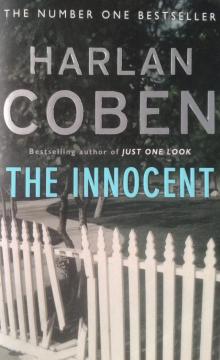 The Innocent
The Innocent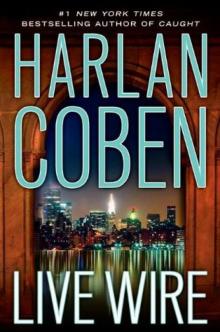 Live Wire
Live Wire Play Dead
Play Dead Drop Shot
Drop Shot Seconds Away
Seconds Away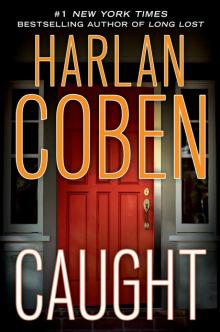 Caught
Caught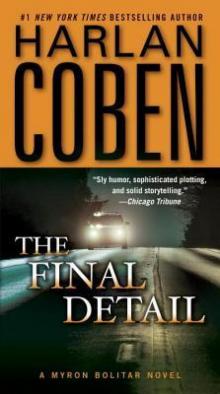 The Final Detail
The Final Detail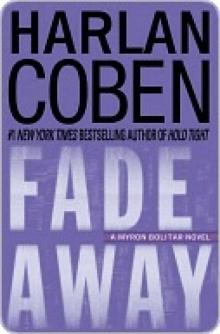 Fade Away
Fade Away Home
Home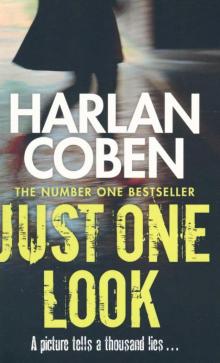 Just One Look
Just One Look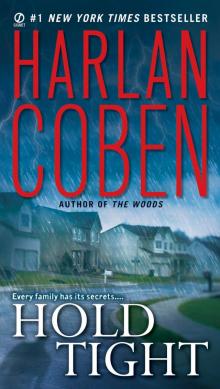 Hold Tight
Hold Tight Fool Me Once
Fool Me Once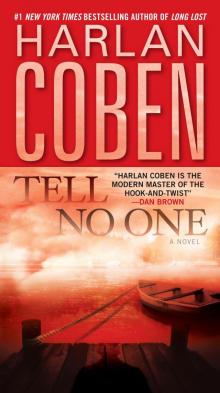 Tell No One
Tell No One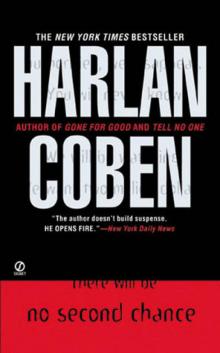 No Second Chance
No Second Chance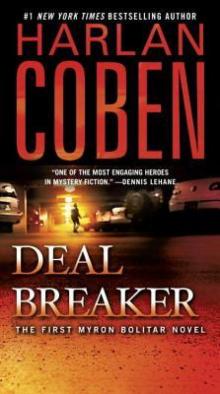 Deal Breaker
Deal Breaker Long Lost
Long Lost One False Move
One False Move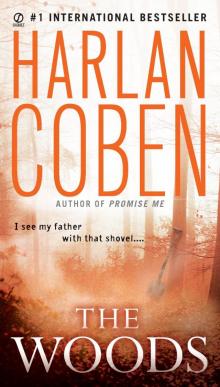 The Woods
The Woods Miracle Cure
Miracle Cure Found
Found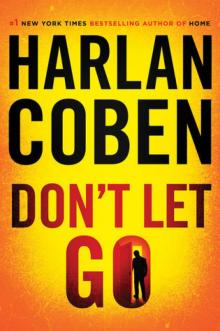 Don't Let Go
Don't Let Go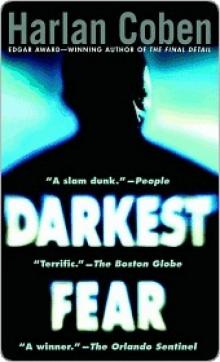 Darkest Fear
Darkest Fear The Stranger
The Stranger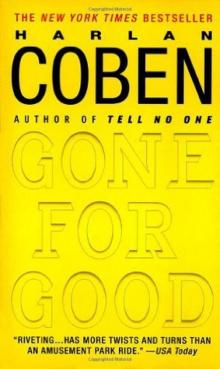 Gone for Good
Gone for Good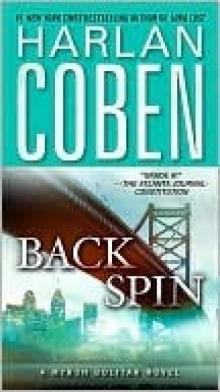 Back Spin
Back Spin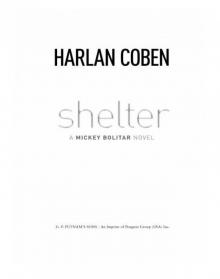 Shelter
Shelter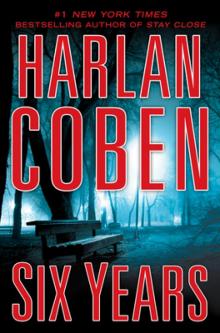 Six Years
Six Years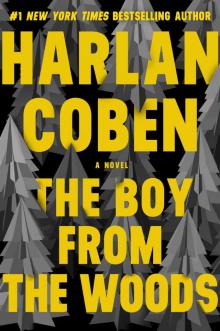 The Boy from the Woods
The Boy from the Woods Missing You
Missing You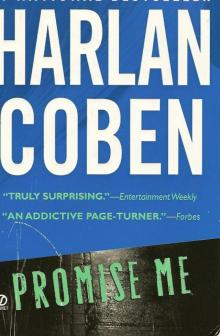 Promise Me mb-8
Promise Me mb-8 The Final Detail: A Myron Bolitar Novel
The Final Detail: A Myron Bolitar Novel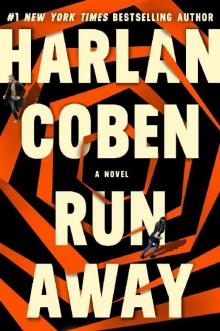 Run Away
Run Away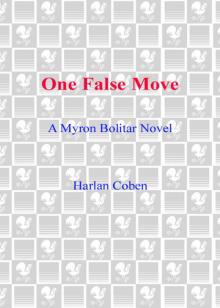 One False Move: A Myron Bolitar Novel
One False Move: A Myron Bolitar Novel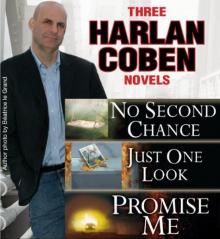 Three Harlan Coben Novels
Three Harlan Coben Novels the Woods (2007)
the Woods (2007) Tell No One (2001)
Tell No One (2001) the Innocent (2005)
the Innocent (2005)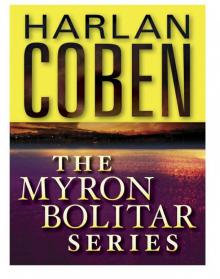 The Myron Bolitar Series 7-Book Bundle
The Myron Bolitar Series 7-Book Bundle Gone for Good (2002)
Gone for Good (2002) Caught (2010)
Caught (2010) Hold Tight (2008)
Hold Tight (2008)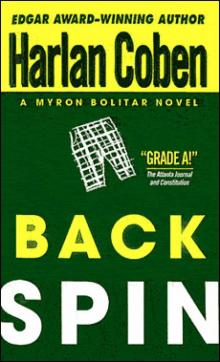 04 - Back Spin
04 - Back Spin Miracle Cure (1991)
Miracle Cure (1991) Harlan Coben 3 Novel Collection
Harlan Coben 3 Novel Collection Just One Look (2004)
Just One Look (2004)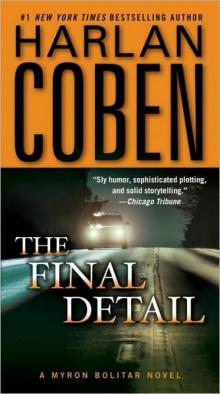 The Final Detail mb-6
The Final Detail mb-6 Play Dead (2010)
Play Dead (2010)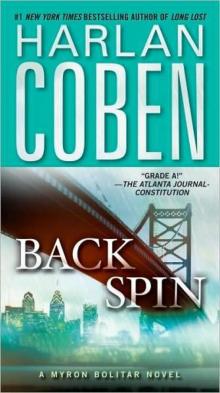 Back Spin mb-4
Back Spin mb-4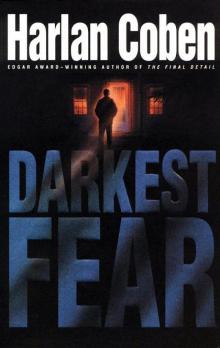 Darkest Fear mb-7
Darkest Fear mb-7